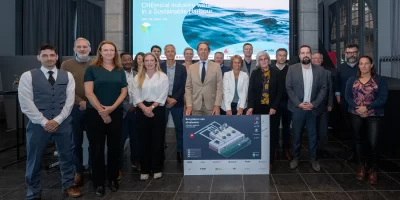
Kobe Verheyen started as the new communications director of Belgian chemicals company DOMO Chemicals in March 2024. In a sector in full transformation, Verheyen’s main aim is to highlight the importance of a strong chemical industry in Europe and initiatives around sustainability.
The Turnhout native started his career as a reporter for Gazet van Antwerpen, where he followed national and international news until he was 30. His broad interest in economics led him to the world of corporate communications, where he handled communications for various companies such as Graydon, Vanbreda Risk & Benefits and Philip Morris.
“At these companies I had the unique opportunity to gain experience in an international context,” indicates Kobe Verheyen. “In each case, they were companies in transformation, where the communication strategy also had to be redesigned. The chemical sector is also in full transformation; in this respect, it is crucial to highlight the importance of the sector and sustainable initiatives.”
Anchoring
With a turnover of EUR 1.38 billion and 2,070 employees worldwide, DOMO is still a family business, owned by the Jan De Clerck family. The chemical company specialises in the production of polyamide, or Nylon colloquially, and has 10 production sites worldwide. It is headquartered in Ghent with 50 employees.
“We are very strongly Flemish and European anchored, but obviously with a global outlook,” Verheyen points out. “The backbone of our production is in Europe, with sites in France (Lyon and Valence), Germany (Premnitz and Leuna, near Leipzig), Poland (Gorzow), Italy (Arco) and Spain (Blanes). But we also have production sites in China, India and the United States, because we also want to provide products for our customers in these growing markets.”
DOMO’s core business is polyamide, which is used in many applications. “It is a so-called ‘intelligent plastic’, which is very strong, weighs little and can also be tuned with insulating and flame-retardant properties. Polyamide can therefore be found in a wide variety of applications ranging from clothing to household appliances to housings of all kinds. Because it is resistant to strong chemicals, it is also used in car cooling systems, for instance,” explains Verheyen.
Transport
Polyamide is also increasingly being looked at in the transport sector. “Polyamide is in this sense a good alternative to metal, as it can, for example, make parts for electric passenger cars and trucks lighter in order to optimise the driving range.”
As a chemical company, DOMO is committed to sustainability and recycling. “For example, within our product portfolio we have the brand ‘TECHNYL®4EARTH®’, which is polyamide based on recycled material. For example, we turn used airbags and old fishing nets into polyamide again. In this sense, we contribute to the circular economy.”
From companies, DOMO says it is already receiving a lot of demand for this sustainable solution. “We see that most companies are very actively working to get their carbon footprint down,” says Verheyen. “We can help them do this by also making our solutions more sustainable. Today, already 13% of our TECHNYL production comes from circular or bio-based materials, by 2020 we want to go to 20%.”
Europe
“In addition, it is of prime importance to us that the manufacturing industry remains here in Europe,” says Verheyen. “We want to play an active role with DOMO to help ensure that. In line with the ‘Antwerp Declaration’ – which our CEO Yves Bonte co-signed – we therefore ask Europe to work on a coherent policy for the industry. Mainly on energy, infrastructure and regulation, efforts are needed, but also on sustainability and supporting homegrown talent.”
Kobe Verheyen is married and father of two children. “In my spare time, I like to take short trips with the family, especially to the Ardennes and the North Sea,” Kobe Verheyen shares. “I also love going out for a nice dinner or a fresh pint – and as a former journalist, I can also enjoy reading good, quality journalism.”




